Coronavirus: Birmingham to get more support as virus cases rise
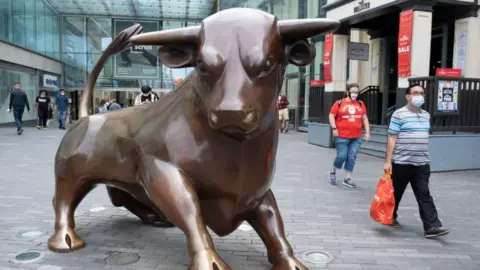 Getty Images
Getty ImagesBirmingham has been added to a watchlist as an "area of enhanced support", amid growing concerns about a rise in coronavirus cases in the city.
Birmingham will see more testing and the health secretary is meeting city leaders to discuss further steps.
Cases of Covid-19 are rising quickly, with 31 cases per 100,000 last week. More than half of these cases were people aged 18 to 34.
Birmingham council leader Ian Ward said it was a "wake-up call for everyone".
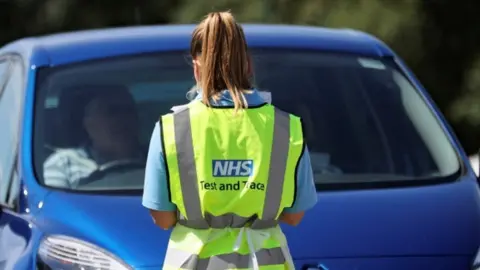 Reuters
ReutersThe Labour leader said the council would announce "as soon as possible" what this meant for people in the city.
"If our previous warnings to keep doing the basics haven't been enough, this has to be the wake-up call for everyone," he said.
"Wash your hands, wear face coverings wherever possible, keep two metres apart from others and get tested if you have Covid-19 symptoms."
'Virus returning'
West Midlands Mayor Andy Street, who is taking part in the meeting with Matt Hancock, said some people "had not been strict enough" in keeping up the basic steps.
"People across the region have made an enormous sacrifice since the start of lockdown to keep the virus at bay, but the virus is now returning and recent efforts to counter that have been insufficient," he said, urging people to "re-double their efforts".
It comes a week after statistics showed the rate of infection had more than doubled.
The infection rate is below levels in Leicester and parts of northern England when measures were introduced there.
Figures published on Friday showed a rate of 25.5 new cases per 100,000 people in Birmingham in the seven days to 18 August, down from 29.2.
Businesses in the city must enforce government advice to prevent a local lockdown, the council said.
It stated they must ensure bookings were not taken for over six people and for parties from more than two households, as well as other measures including social distancing.

What's the situation?
New coronavirus cases in Birmingham have been increasing for a few weeks. Some 351 were recorded in the week to 16 August, up from 256 the week before and 144 the week before that.
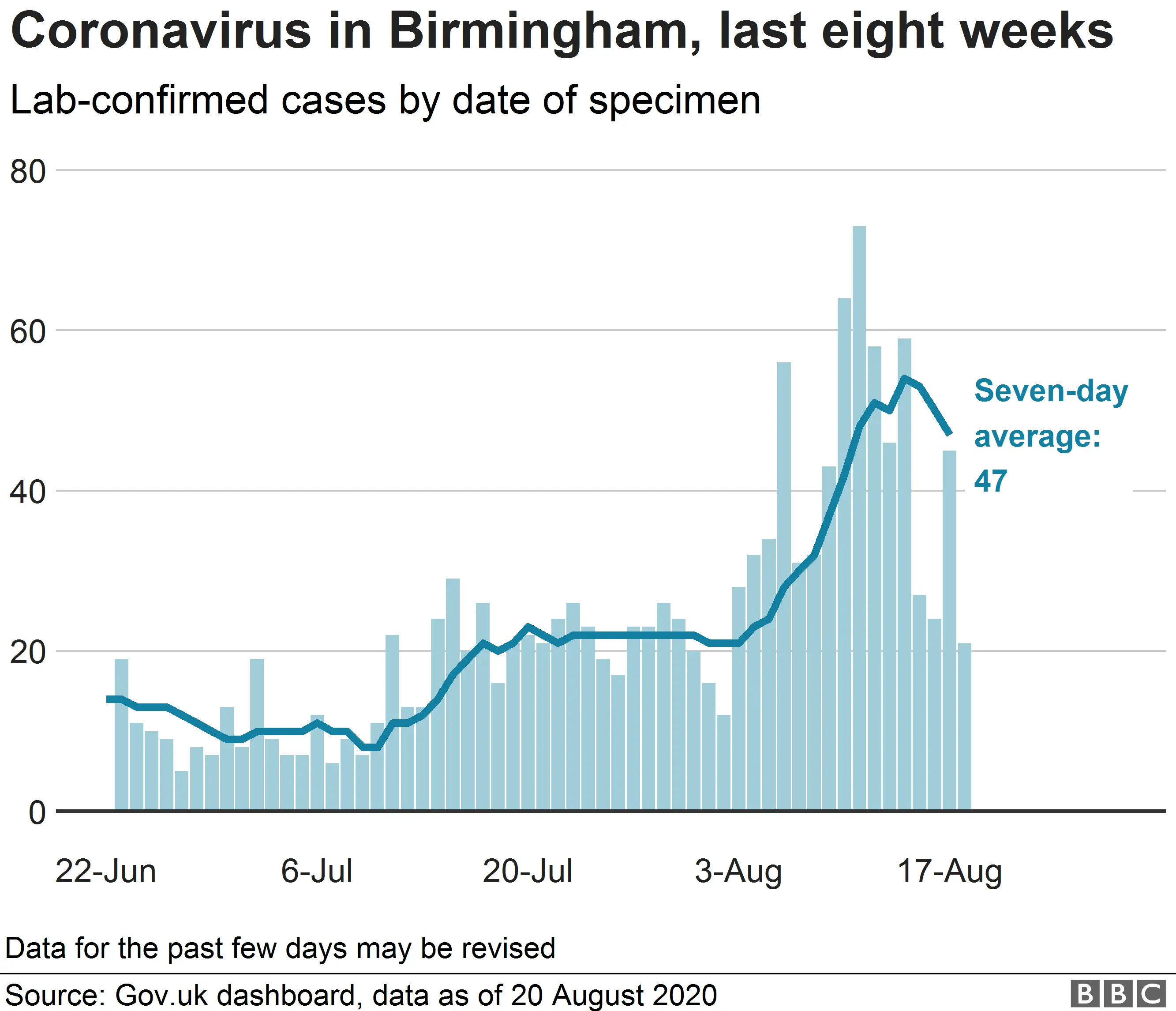

And as a city of more than a million people, that worked out at just under 31 per 100,000 residents last week.
While cases are rising, the figures are well below areas such as Northampton, where the rate of infection stands at 116.6 cases per 100,000 people, and Oldham, where the rate is 86.9.
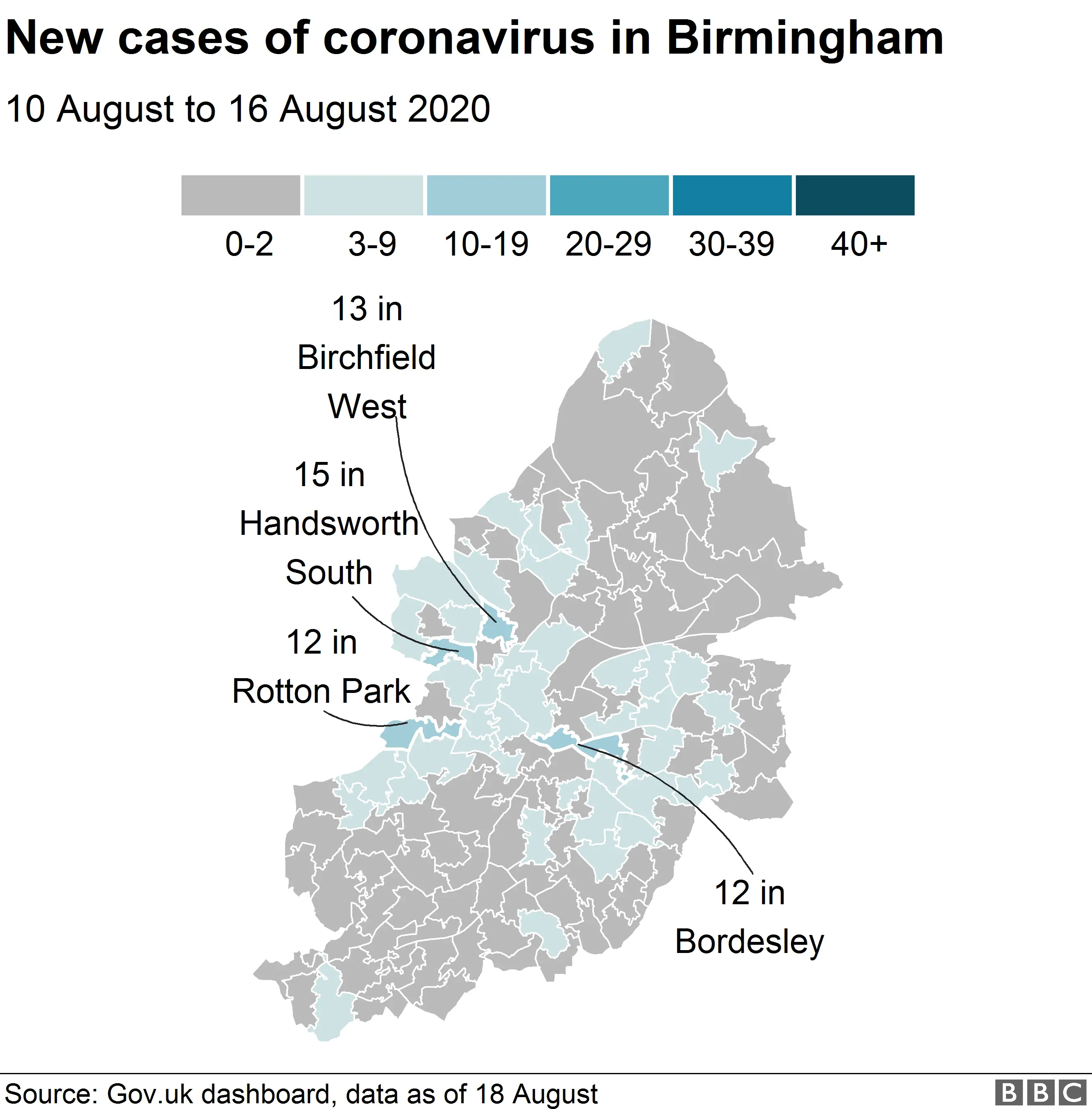

Across the whole of England, the rate was 12 per 100,000.
Birmingham is within the top 20 of the 315 local authority areas in England for new cases.
The breakdown of cases in Birmingham shows 15 recorded last week in Handsworth South, with Birchfield West, Rotton Park and Bordesley also recording more than 10 each.

 Getty Images
Getty ImagesDr Ron Daniels, an intensive care consultant in the West Midlands, said that despite the increase "our hospitals are relatively empty of patients with this condition".
"We're seeing very few patients admitted to hospital let alone requiring intensive care," he said, adding: "It's true that testing at the moment is identifying a younger population who don't tend to become as seriously ill."
What would being on a watchlist mean?
Every week, PHE publishes a list of areas it is concerned about based on new coronavirus infection rates and other local intelligence.
These places are categorised as either "areas of concern", "areas of enhanced support" or "areas of intervention", and measures range from increased testing to stricter lockdowns.
In parts of the country in "intervention", such as Greater Manchester, restrictions have had to be imposed that are different to the rest of England, such as banning households from meeting indoors.
One rung down from this is an "area of enhanced support". Councils in this category are given more resources such as epidemiological experts or mobile testing stations, but there are no additional restrictions to people's day-to-day lives.
The lowest rung is an "area of concern", which involves taking "targeted" action to reduce the spread, such as more testing in care homes or more communication with at-risk groups.
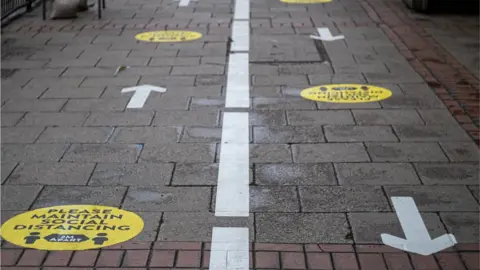 Getty Images
Getty ImagesWhat might happen?
Birmingham City Council has already made some decisions in the past few days, including a ban on non-essential visits to care homes and a "drop and collect" trial for virus tests to help limit the rising number of cases.
The authority has also warned that unless the situation is brought under control, lockdown restrictions from "the dark days of spring... could all happen again".
Sandwell, which borders Birmingham, was placed on the PHE watchlist as an "area of concern" in July.
The authority did not close shops or restaurants, instead urging those who were shielding to continue doing so, and strongly advising residents not to go inside other people's homes.
At its peak, Sandwell's rate of infection was 28.1 per 100,000 people. As of last week, it was still on the watchlist but its rate had come to down to about 23 per 100,000, despite a recent outbreak at a DPD depot in Oldbury.
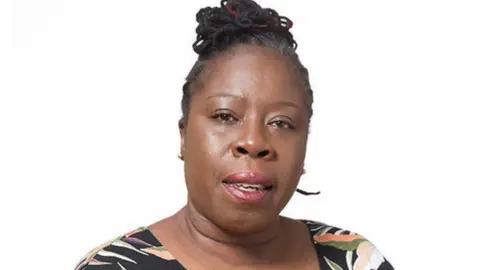 Birmingham City Council
Birmingham City CouncilWhat are people saying?
On Thursday, council leader Ian Ward said the city was "at a crossroads".
"If we don't follow the basic health advice... we will face more tragedy in the weeks and months ahead," he said.
"More people will fall seriously ill, there will be more deaths and our economy will face another hammer blow."
The authority's cabinet member for health and social care, Paulette Hamilton, also said this week that she believed "at some point between now and Christmas we will be in a local lockdown".
West Midlands Police has joined the authority in calling for residents to follow guidelines following weeks of shutting down hundreds of illegal gatherings.
"If new cases rise we will undoubtedly face the potential of stepping back into those restrictions," Supt Gareth Morris said in a personal appeal.
"We all must do what we can to avoid another lockdown."

- SYMPTOMS: What are they and how to guard against them?
- FACE MASKS: When should you wear one?
- TESTING: Who can get a test and how?
- LOOK-UP TOOL: How many cases in your area?

Follow BBC West Midlands on Facebook, Twitter and Instagram. Send your story ideas to: [email protected]
